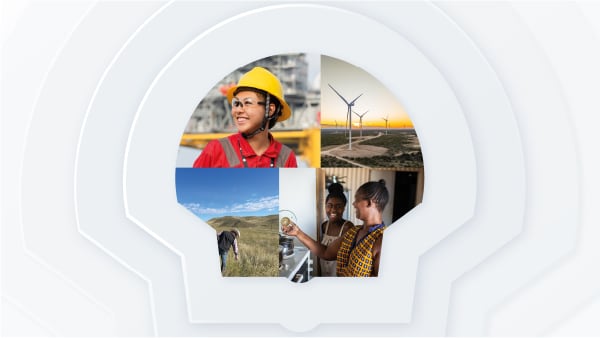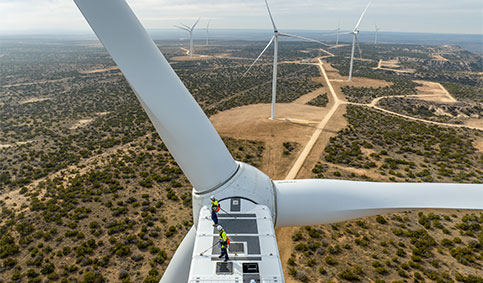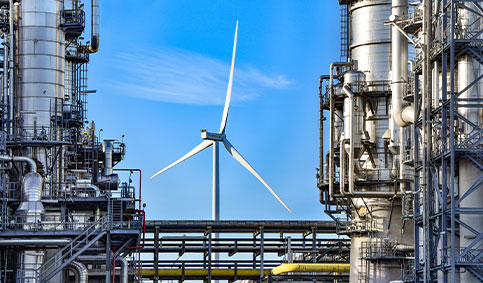Executive summary
Our target to become a net-zero emissions energy business by 2050 remains at the heart of our strategy to deliver more value with less emissions. We are transforming our business, reducing emissions from our operations and energy products, while growing sales of low-carbon solutions.
We support a balanced energy transition, one that maintains secure and affordable energy supplies as the world moves to net zero. Shell has an important role to play in providing the energy the world needs today, and in helping to build the low-carbon energy system of the future.
Comprehensive, coherent and consistent government policies will play a crucial role in the world’s journey to net zero. Public policy, along with developments in technology and infrastructure, and a functioning carbon market, are essential to create the demand signals for the private sector to invest at scale. It will require collaboration between policymakers, customers and private organisations like Shell that have the financial strength, experience and capabilities to help build the low-carbon energy system of the future.
The right policy and regulatory conditions could help to provide more profitable investment opportunities through the energy transition. We advocate robust policies, legislation and regulations in areas where we can best support the decarbonisation of our customers and reduce our own emissions.
Our advocacy, directly with governments, and indirectly through industry associations and coalitions, is a key part of how we implement our strategy. Shell engages with governments, regulators and policymakers in different ways to help shape policy, legislation and regulation. In 2023, we supported the outcome of the UN Conference of Parties (COP28) in the UAE where nearly 200 countries agreed to transition away from fossil fuels.
We believe that lobbying transparency is important. We engage with investors, international and civil society organisations, companies and industry associations as we further develop our approach to lobbying transparency. Initiatives such as the Global Standard on Responsible Corporate Climate Lobbying and the Climate Action 100+ Net Zero Company Benchmark aim to encourage greater transparency around climate-related lobbying by companies and industry associations.
This report provides an update on our direct and indirect climate and energy transition lobbying in 2023. It is the sixth year that we have reported on our industry associations and provided updates about our advocacy related to climate and the energy transition.
Paris alignment
The Paris Agreement aims to strengthen the global response to the threat of climate change by “holding the increase in the global average temperature to well below 2°C above pre-industrial levels and pursuing efforts to limit the temperature increase to 1.5°C above pre-industrial levels”.[1] Shell supports the more ambitious 1.5°C goal of the Paris Agreement.
To limit the temperature increase to 1.5°C, the world would need to reach net zero by around 2050, according to the Intergovernmental Panel on Climate Change (IPCC).[2] Shell has set a target to achieve net-zero emissions by 2050.[3]
We are committed to lobbying for policy positions that we believe are in line with the goals of the Paris Agreement and the world achieving net-zero emissions by 2050. This applies to our direct and indirect lobbying.
Within the industry associations we are members of, we are committed to advocating policy positions that we believe are in line with the goals of the Paris Agreement and the world achieving net-zero emissions by 2050.
Policy positions
Our climate and energy transition policy positions serve as a global framework for our advocacy with governments, international organisations, industry associations, and other stakeholders, globally, regionally and within countries. In using the positions, we recognise that the pace of the energy transition will vary around the world.
In March 2024, we updated our climate and energy transition policy positions to be in line with our Energy Transition Strategy 2024.[4] We believe our positions support the goals of the Paris Agreement and the world achieving net-zero emissions by 2050.
The positions focus on the policies that we believe are needed to support the development of critical technologies and infrastructure, and encourage customers to choose low-carbon alternatives. They cover net-zero emissions policies and specific policy areas relating to the secure supply of energy, changing energy demand in the transport and industry sectors, and growing low-carbon solutions such as biofuels, renewable power, carbon capture and storage (CCS) and hydrogen.
Direct lobbying transparency
In this report, we review key aspects of our climate and energy transition advocacy in 2023. We focus on advocacy in relation to our public policy positions on net-zero emissions, carbon pricing, oil and gas, methane emissions, road transport, aviation, shipping, power, CCS and hydrogen.
We also provide more detailed information on our website about our positions and advocacy on key policies, legislation and regulations related to climate and energy transition at an international and country level.[5]
Indirect lobbying transparency
We value our memberships of industry associations, which provide a platform for industry-wide engagements with governments, regulators and communities on a range of issues. Many of the associations we are members of engage on public policy, legislation and regulation. They play an important role in developing and implementing industry standards and best practices in areas such as health, safety, security and the environment.
We have updated our principles for participation in industry associations. These principles set out our governance of our memberships. They describe how we review the climate and energy transition policy and advocacy positions of key associations, and how we address misalignment.
In line with our principles, we publish a review of the policy and advocacy positions of our key industry associations every two years. Where we identify misalignment with our positions, we set out how we plan to address this and provide an update the following year.
We published our last detailed review in our Climate and Energy Transition Lobbying Report in March 2023. We reviewed 39 key industry associations and found some misalignment in positions with 10 associations. In this update, we provide an overview of the actions we have taken over the past year to address these differences in our positions. We also provide an update about the Queensland Resources Council, which we left in September 2023.
In May 2024, we published an updated list of some of our memberships of industry associations and similar organisations on our website.[6]
We plan to publish our next detailed industry associations review in 2025.
Next steps
Over the coming year, we intend to publish information about our direct and indirect climate and energy transition lobbying in some additional countries that are significant for our strategy. This includes:
- Adding information about our lobbying in these additional countries to our website;
- Expanding the scope of our list of industry associations and similar organisations to cover these countries; and
- Expanding the scope of our Climate and Energy Transition Lobbying Report to cover these countries. This includes providing information about our direct advocacy and reviews of some additional industry associations.
[1] unfccc.int/sites/default/files/resource/parisagreement_publication.pdf
[2] www.ipcc.ch/2022/04/04/ipcc-ar6-wgiii-pressrelease/
[3] Our target to achieve net-zero emissions by 2050 is across Scopes 1, 2 and 3.
[4] www.shell.com/sustainability/transparency-and-sustainability-reporting/advocacy-and-political-activity/global-climate-and-energy-transition-policy-positions.html and www.shell.com/sustainability/our-climate-target/shell-energy-transition-strategy.html









